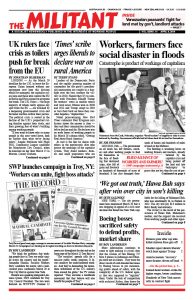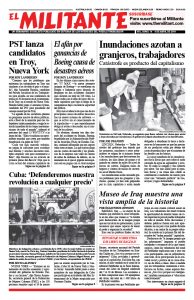LONDON — As the March 29 deadline for the U.K. to leave the European Union loomed without any agreement over how this division would be managed, the capitalist rulers here and those who control the EU in Berlin and Paris agreed to postpone the break. The U.K. rulers — the large majority of whom really oppose any split from the EU — are wracked by a deepening governmental crisis and factional warfare within their parties. The political crisis is rooted in the decline of the U.K.’s propertied ruling families against their rivals, and their growing fear of what’s building among working people.

“If you want to know why so many people in this area voted leave, look no further than what we’re facing today,” Angela Pattinson told Hugo Wils, Communist League candidate for Manchester City Council, when he knocked on her door March 15 in Murton, County Durham.
“My father was a miner and the pits are shut. My son is disabled and his monthly care hours have been cut by 80 hours,” she said. “The Urgent Care center in nearby Peterlee hospital has been closed. For a good while my husband was paid below minimum wage. There’s a lot of job competition here.
“The area is plagued by drug and alcohol abuse. And the government told us to hold on — to hold onto what they’ve been doing over all these years, and to hold onto the EU,” she said. Wils and other CL members were introducing the party to workers in the area.
“They should have left the EU the day after the Brexit vote,” Stephanie Hinds told Wils in nearby Shotton. “There was nothing to negotiate, then or now.” Hinds had worked for years as a sewing machine operator in two unionized garment plants, both of which are now closed. Her husband Joe, a member of the National Union of Mineworkers, worked underground for 30 years in five collieries.
These comments reflect a widely held view among working people facing the carnage of today’s capitalist crisis in the U.K.
U.K. rulers press for new vote
Prime Minister Theresa May secured unanimous agreement from EU members to postpone the deadline for the U.K. to quit the EU, now set for April 12. By then May hopes to win support for her Brexit-in-name-only “deal,” already twice rejected by Parliament. It would keep the U.K. tied to significant parts of EU membership.
As the political crisis builds here, there are growing calls for May’s resignation, including from two dailies that have been supporting the government. The campaign by the rulers to overturn the vote taken in 2016, in which a majority — 17.4 million people — voted for the U.K. to leave has gone into overdrive. Some politicians from the main capitalist parties want to force workers to vote over and over, if need be, until they get it “right” — by voting to remain in the EU.
In a March 13 House of Commons vote, Members of Parliament voted to take “no deal” Brexit off the table under any circumstances. An online petition to revoke Article 50, which under the Treaty of Lisbon gives a member state the right to quit the EU, has been signed by 5 million people. Labour Party leader Jeremy Corbyn refuses to rule out revocation. The party favors keeping U.K. in the single market and customs union, and is open to a new referendum. Hundreds of thousands took to the streets of London March 23 in a demonstration for a second referendum addressed by Labour, Conservative, Liberal Democrat and “independent” MPs, who recently split from the two major capitalist parties.
In a joint statement March 21, leaders of the Confederation of British Industry and Trades Union Congress demanded Theresa May seek a long extension to the U.K.’s membership.
EU President Donald Tusk says all options remain on the table — “a deal, no deal, a long extension or revoking Article 50.”
In a letter to the Spectator, former Conservative Chancellor of the Exchequer Nigel Lawson says John Kerr, the British diplomat who composed Article 50, told him its purpose “was to make it as difficult as possible for a country to leave the European Union.” Lawson said Kerr “did a good job.” Nonetheless, working people here have demanded the U.K. get out.
“Workers have no voice in all this,” John Pearton, another former miner in Murton, told Wils. Pearton’s comment highlighted the fact that the entire debate between those wishing to leave or remain is dominated by parties that look after the interests of the bosses.
While the EU is ballyhooed as a great common economic and political union, in fact it’s a protectionist bloc and benefits first and foremost the most powerful bosses in Europe, those in Germany and, to a lesser degree, France. The EU and its common currency means it attracts profits at the expense of weaker capitalist rulers in the bloc, like those of Greece. The growing capitalist crisis and increasing competition means the EU is fraying at the seams — with sharpening divisions among Germany, France and Italy, the three founding members and among the largest economies in the EU.
Talking with Andy Welford at his family’s dairy farm in north Yorkshire, Wils said that he had participated in a yellow vest protest alongside thousands from rural France. “Solidarity with these rural toilers would be strengthened by the U.K. getting out of the EU now,” he said. Welford said he tends to support staying in the EU.
“We need to reject the trap of lesser evil capitalist politics and the illusion of a European union. The EU is a den of thieves and it’s coming apart,” Wils said. “Workers and farmers have nothing in common with either London or Brussels.
“Getting out of the EU means we’ll confront directly the chief source of workers’ problems here — the British capitalist rulers,” he said. “We should look toward working people of town and country as a force capable of fighting for and winning social change.”

